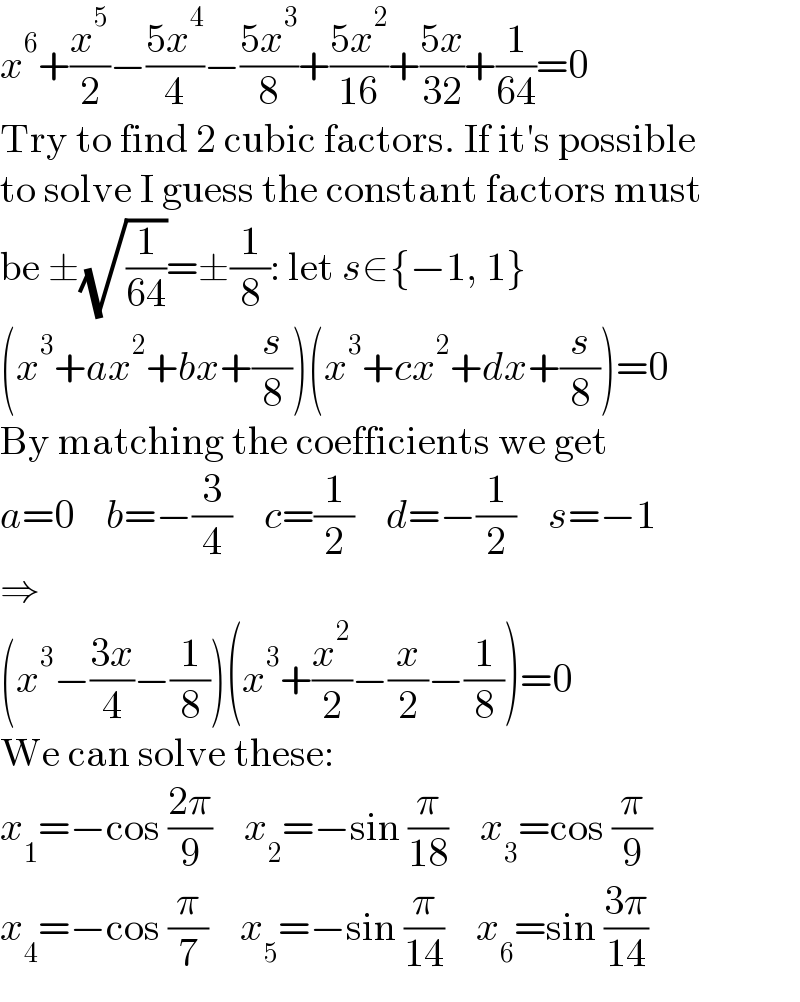
Question Number 187811 by Rupesh123 last updated on 22/Feb/23

Answered by Frix last updated on 22/Feb/23

$${x}^{\mathrm{6}} +\frac{{x}^{\mathrm{5}} }{\mathrm{2}}−\frac{\mathrm{5}{x}^{\mathrm{4}} }{\mathrm{4}}−\frac{\mathrm{5}{x}^{\mathrm{3}} }{\mathrm{8}}+\frac{\mathrm{5}{x}^{\mathrm{2}} }{\mathrm{16}}+\frac{\mathrm{5}{x}}{\mathrm{32}}+\frac{\mathrm{1}}{\mathrm{64}}=\mathrm{0} \\ $$$$\mathrm{Try}\:\mathrm{to}\:\mathrm{find}\:\mathrm{2}\:\mathrm{cubic}\:\mathrm{factors}.\:\mathrm{If}\:\mathrm{it}'\mathrm{s}\:\mathrm{possible} \\ $$$$\mathrm{to}\:\mathrm{solve}\:\mathrm{I}\:\mathrm{guess}\:\mathrm{the}\:\mathrm{constant}\:\mathrm{factors}\:\mathrm{must} \\ $$$$\mathrm{be}\:\pm\sqrt{\frac{\mathrm{1}}{\mathrm{64}}}=\pm\frac{\mathrm{1}}{\mathrm{8}}:\:\mathrm{let}\:{s}\in\left\{−\mathrm{1},\:\mathrm{1}\right\} \\ $$$$\left({x}^{\mathrm{3}} +{ax}^{\mathrm{2}} +{bx}+\frac{{s}}{\mathrm{8}}\right)\left({x}^{\mathrm{3}} +{cx}^{\mathrm{2}} +{dx}+\frac{{s}}{\mathrm{8}}\right)=\mathrm{0} \\ $$$$\mathrm{By}\:\mathrm{matching}\:\mathrm{the}\:\mathrm{coefficients}\:\mathrm{we}\:\mathrm{get} \\ $$$${a}=\mathrm{0}\:\:\:\:{b}=−\frac{\mathrm{3}}{\mathrm{4}}\:\:\:\:{c}=\frac{\mathrm{1}}{\mathrm{2}}\:\:\:\:{d}=−\frac{\mathrm{1}}{\mathrm{2}}\:\:\:\:{s}=−\mathrm{1} \\ $$$$\Rightarrow \\ $$$$\left({x}^{\mathrm{3}} −\frac{\mathrm{3}{x}}{\mathrm{4}}−\frac{\mathrm{1}}{\mathrm{8}}\right)\left({x}^{\mathrm{3}} +\frac{{x}^{\mathrm{2}} }{\mathrm{2}}−\frac{{x}}{\mathrm{2}}−\frac{\mathrm{1}}{\mathrm{8}}\right)=\mathrm{0} \\ $$$$\mathrm{We}\:\mathrm{can}\:\mathrm{solve}\:\mathrm{these}: \\ $$$${x}_{\mathrm{1}} =−\mathrm{cos}\:\frac{\mathrm{2}\pi}{\mathrm{9}}\:\:\:\:{x}_{\mathrm{2}} =−\mathrm{sin}\:\frac{\pi}{\mathrm{18}}\:\:\:\:{x}_{\mathrm{3}} =\mathrm{cos}\:\frac{\pi}{\mathrm{9}} \\ $$$${x}_{\mathrm{4}} =−\mathrm{cos}\:\frac{\pi}{\mathrm{7}}\:\:\:\:{x}_{\mathrm{5}} =−\mathrm{sin}\:\frac{\pi}{\mathrm{14}}\:\:\:\:{x}_{\mathrm{6}} =\mathrm{sin}\:\frac{\mathrm{3}\pi}{\mathrm{14}} \\ $$
Commented by Rupesh123 last updated on 22/Feb/23
Great!
Commented by Frix last updated on 22/Feb/23
��
